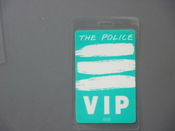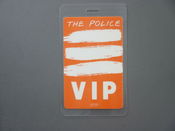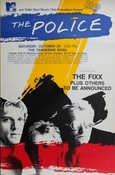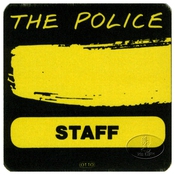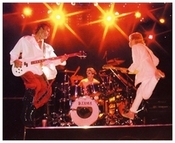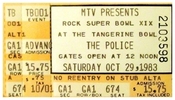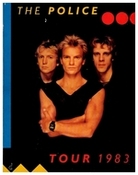
Synchronicity
Oct
29
1983
Orlando, FL, US
Tangerine Bowlwith The Animals, The Fixx
The Police - every little thing they did was magic...
The letter-writer was miffed and clever. ''We know every breath they take and every move they make,'' he wrote to a national magazine, sending up ''their'' latest mega-hit. ''Sting is weird and The Police are touring America. We KNOW that, so give us a break, will you?''
Welcome to the real world, Jailbait: You cannot expect everyone to roll over and play dead just because you're tired of hearing about The Police.
The Police were either the most intelligent or the most palatable to come out of the British New Wave music movement that hit the States in the late '70's. It was in 1979 that the three bleached blonde men who are The Police - Sting, Andy Summers, Stewart Copeland - shredded our buzzsaw-rock complacency with their sad paean to 'Roxanne'.
''Raaaahhhxxxxxanne,'' Police singer Sting yowled to a startling ska - cultural cousin to reggae - rhythm, ''you don't have to sell your body to the night.''
The Police set us on our, er, ears.
And in the years since, we Americans have handcuffed ourselves to the Police, buying up each of the group's albums as soon as they were made available to us, and sending their singles racing ever up and up the charts. (A little humor that, in chart lingo, bullets accompany The Police's ascent.) And we've watched every move they make, and listened to every breath they take.
Yes, The Police are touring America; and Saturday night - a superbly balmy night on which the group's globally inspired waves of sound seemed to shimmer in air that had all the cool vigor of, say, a Moet Chandon; though most there, because of their age, would have described the evening as ''awesome'' - The Police laid waste to Orlando. Every little thing they did was magic.
But their bag of tricks is hard to understand. Don't get me wrong: They are good - oh, they are good. But it was Sting who has said, ''You can entertain people and still educate them.'' And so the mystery intensifies when The Police's appeal is compared to those of its Orlando opening acts: The Animals and The Fixx.
The Animals, a '60's ''message'' group whose legacy is a string of defiant, danceable, tunes such as 'It's My Life' and 'We Gotta get Out of This Place', has recently regrouped. If the Orlando crowd was any indication, it was not by popular demand. It was not too unfair to say that the attention given the FLEA WORLD aerial ad doing lazy loops around the Tangerine Bowl was more generous than that accorded The Animals. While the group's set was all right, it should be noted that there's something not entirely convincing about a middle-aged, barrel-chested man - The Animals' lead singer Eric Burdon - wailing ''Oh, Lord, please don't let me be misunderstood.'' The Police's guitarist Andy Summers once played with The Animals.
Members of The Fixx look like a set of Ginsu knives: blade-thin, full of long angles, with even their faces laying in sharp relief to everything around them. I think their image is their substance. This is the second time I've seen The Fixx - incidental occurrences, both times - and I still don't know what the shouting is about; I cannot find either the entertainment or education value.
They sing songs called 'Red Sky at Night' and 'Reach the Beach' and 'Saved by Zero' and 'One Thing Leads to Another' and I can make no sense out of them. Maybe it's because I'm not an alienated teen-ager any more; and, I suspect, neither are members of The Fixx. But the crowd loved them.
And then came The Police.
Do you know that The Police once toured the Third World, a region whose rich musical heritage plays significantly in The Police's own best-selling music, and visited areas where no one knew who they were, and where few spoke their language? And that, even in those places, they were a hit? The Police's 'Zenyatta Mondatta' album is a retrospective of that experience. The words 'Zenyatta Mondatta', by the way, don't mean anything in any language. And that's an important point that will be dealt with, clumsily, in a bit. Theirs is the music of esoteric jazz rooms of America; and the brawling, iconoclastic rock found in British music halls; and the incantatory percussive
punctuations of far-flung countries populated by dark people.
Theirs is a musical panoply that is original because of the parts chosen to become the sum of those parts. Coupled with that sound are lyrics which alternate between complexity and simplicity, between the refinement of the literate and the crudeness of instinct. It is a combination that is both magnetic and unsettling.
In 'Wrapped Around Your Finger' Sting sang, ''You consider me the young apprentice, Caught between the Scylla and Charibdes; Mephistopheles is not your name, But I know what you're up to just the same; Devil and the deep blue sea behind me, Vanish in the air you'll never find me.''
In 'Hole in My Life' as performed Saturday night, The Police galloped through what should be an introspective subject. But noooo. Picking up the bass beat and shouting ''There's a great BIG hole in my life,'' Sting provided the greatest moment of inspiration belonging to that evening by swinging into Ray Charles' 'Hit the Road, Jack' and doing several minutes of that - ''and doncha come back no more, No More, No More, NO MORE'' - before easing back into 'Hole in My Life'.
Sometimes, The Police's romp with the Orlando crowd sounded like the old phonics courses that used to be offered in elementary schools.
Sting - who is, like it or not, the flamboyant focal point of The Police - was the plumed-out, ribboned-out and spiky-haired Mister Rogers who led his thousands of eager students through sing-alongs that went something like this: Can you say ''Eo-ao-eao,'' Sting crooned.
And looking at his larger-than-life image beamed onto the twin video screens flanking the stage, looking at those cheekbones that could slice bread and have torn asunder many hearts, the crowd chanted, ''Eo-ao-eao.''
''I like it,'' Sting said.
Sting told Life magazine that pop music should be ''sexy, danceable and carry a social message.''
The Police's pop music is more than all the above. The sexiness Dan the danceability are easy to explain, the dance-music-sex-romance - which is how another Prince of pop succinctly puts it - that is the siren song of rock, is easy to define their stuff.
So, what does the rest of it mean?
Something as trite as: music really is the universal language?
That it's not so much the words, but the intentions, that are important in musical art?
That, as The Police sing, ''One world is enough for us''?
That, by our overwhelming acceptance and approval of The Police's one-world sound, we are ready to accept that notion?
Hell if I know.
One thing is certain: We are going to be hearing a lot more about The Police because even The Establishment - Life magazine, in this case - proclaims the group ''has come closer to matching The Beatles' international glory'' than any other. Indeed, The Police's recent triumph at Shea Stadium has been likened to The Beatles' 1964 shake-rattle-and-steamroll stomp there.
And we are left to wonder, while we're tapping our toes and humming along, just what it is about The Police that has much of the music-listening world going bonkers.
Maybe The Police said it best in one of their greatest hits: ''De-do-do-do, De-da-da-da, that's all I want to say to you.''
(c) Florida Today by Pam Platt
Police live up to super billing at Tangerine Bowl...
Dwarfed by their sound system and barely visible from the far end of the Tangerine Bowl stage, a trio of musicians collectively known as the Police arrested the attention of more than 30,000 fans Saturday. It was, in no uncertain terms, a fine concert.
The Police were headliners on a bill that included Eric Burdon and the Animals (remember them?) and The Fixx in a late-afternoon gathering dubbed Rock Superbowl XIX. I enjoyed a certain smugness knowing that Orlando has staged more ''Superbowls'' than the NFL, thought I'm not sure that the three-band lineup - even a high quality one like this - qualified as a ''Superbowl'' event until MTV's Martha Quinn announced that the Police performance would be getting video coverage.
Giant video screens flanked the stage, the weather was perfect, the concert began.
First up were Eric Burdon and the Animals. As one of the best known rhythm-and-blues bands of the mid-'60's, the original Animals briefly contended for popularity with the likes of the Beatles before disbanding at the end of the decade. Burdon's style hasn't changed. His voice still has its old, raspy power but took a few songs before it regained its subtlety. Burdon can still do ''House of the Rising Sun'' better than anyone else.
The Fixx, who appeared in Orlando for the first time last June (as the opening act for Flock of Seagulls), continue to show great promise. Their music was funky, angular and dramatic. Two of their best efforts were ''Red Sky'' and ''The Fall.''
The Police of course have received giant amounts of self-perpetuating publicity on a nationwide tour that has included virtually nothing but stadium-and arena-sized audiences. Not bad for a group that has turned out only five albums in as many years.
At the heart of the Police success story is Sting (Gordon Sumner), the band's spokesman and main songwriter. Though there are a few exceptions, his lyrics don't exactly send me, nor does his music. But he has been smart and tasteful enough to avoid overexploiting any one pop-rock idiom. Add to that the band's excellent musicianship and you have one of the most popular bands of the past six years.
Their appeal is broadened by Sting's ability to mix bits of rock, jazz and reggae in varying concentrations.
''Do you know me?'' he asked the crowd from a darkened stage before the concert began. The answer was obvious.
The Police started with ''Synchronicity I'' and found themselves, nearly 90 minutes, later singing ''Roxanne.'' The guitar playing was handled with enchanting, soaring excellence by Andy Summers. The delicate and complex drumming that anchored Sting's bass playing was performed by Stewart Copeland.
The Police made their arrest, then sent their suspects home satisfied.
(c) The Orlando Sentinel by Richard Defendorf
The letter-writer was miffed and clever. ''We know every breath they take and every move they make,'' he wrote to a national magazine, sending up ''their'' latest mega-hit. ''Sting is weird and The Police are touring America. We KNOW that, so give us a break, will you?''
Welcome to the real world, Jailbait: You cannot expect everyone to roll over and play dead just because you're tired of hearing about The Police.
The Police were either the most intelligent or the most palatable to come out of the British New Wave music movement that hit the States in the late '70's. It was in 1979 that the three bleached blonde men who are The Police - Sting, Andy Summers, Stewart Copeland - shredded our buzzsaw-rock complacency with their sad paean to 'Roxanne'.
''Raaaahhhxxxxxanne,'' Police singer Sting yowled to a startling ska - cultural cousin to reggae - rhythm, ''you don't have to sell your body to the night.''
The Police set us on our, er, ears.
And in the years since, we Americans have handcuffed ourselves to the Police, buying up each of the group's albums as soon as they were made available to us, and sending their singles racing ever up and up the charts. (A little humor that, in chart lingo, bullets accompany The Police's ascent.) And we've watched every move they make, and listened to every breath they take.
Yes, The Police are touring America; and Saturday night - a superbly balmy night on which the group's globally inspired waves of sound seemed to shimmer in air that had all the cool vigor of, say, a Moet Chandon; though most there, because of their age, would have described the evening as ''awesome'' - The Police laid waste to Orlando. Every little thing they did was magic.
But their bag of tricks is hard to understand. Don't get me wrong: They are good - oh, they are good. But it was Sting who has said, ''You can entertain people and still educate them.'' And so the mystery intensifies when The Police's appeal is compared to those of its Orlando opening acts: The Animals and The Fixx.
The Animals, a '60's ''message'' group whose legacy is a string of defiant, danceable, tunes such as 'It's My Life' and 'We Gotta get Out of This Place', has recently regrouped. If the Orlando crowd was any indication, it was not by popular demand. It was not too unfair to say that the attention given the FLEA WORLD aerial ad doing lazy loops around the Tangerine Bowl was more generous than that accorded The Animals. While the group's set was all right, it should be noted that there's something not entirely convincing about a middle-aged, barrel-chested man - The Animals' lead singer Eric Burdon - wailing ''Oh, Lord, please don't let me be misunderstood.'' The Police's guitarist Andy Summers once played with The Animals.
Members of The Fixx look like a set of Ginsu knives: blade-thin, full of long angles, with even their faces laying in sharp relief to everything around them. I think their image is their substance. This is the second time I've seen The Fixx - incidental occurrences, both times - and I still don't know what the shouting is about; I cannot find either the entertainment or education value.
They sing songs called 'Red Sky at Night' and 'Reach the Beach' and 'Saved by Zero' and 'One Thing Leads to Another' and I can make no sense out of them. Maybe it's because I'm not an alienated teen-ager any more; and, I suspect, neither are members of The Fixx. But the crowd loved them.
And then came The Police.
Do you know that The Police once toured the Third World, a region whose rich musical heritage plays significantly in The Police's own best-selling music, and visited areas where no one knew who they were, and where few spoke their language? And that, even in those places, they were a hit? The Police's 'Zenyatta Mondatta' album is a retrospective of that experience. The words 'Zenyatta Mondatta', by the way, don't mean anything in any language. And that's an important point that will be dealt with, clumsily, in a bit. Theirs is the music of esoteric jazz rooms of America; and the brawling, iconoclastic rock found in British music halls; and the incantatory percussive
punctuations of far-flung countries populated by dark people.
Theirs is a musical panoply that is original because of the parts chosen to become the sum of those parts. Coupled with that sound are lyrics which alternate between complexity and simplicity, between the refinement of the literate and the crudeness of instinct. It is a combination that is both magnetic and unsettling.
In 'Wrapped Around Your Finger' Sting sang, ''You consider me the young apprentice, Caught between the Scylla and Charibdes; Mephistopheles is not your name, But I know what you're up to just the same; Devil and the deep blue sea behind me, Vanish in the air you'll never find me.''
In 'Hole in My Life' as performed Saturday night, The Police galloped through what should be an introspective subject. But noooo. Picking up the bass beat and shouting ''There's a great BIG hole in my life,'' Sting provided the greatest moment of inspiration belonging to that evening by swinging into Ray Charles' 'Hit the Road, Jack' and doing several minutes of that - ''and doncha come back no more, No More, No More, NO MORE'' - before easing back into 'Hole in My Life'.
Sometimes, The Police's romp with the Orlando crowd sounded like the old phonics courses that used to be offered in elementary schools.
Sting - who is, like it or not, the flamboyant focal point of The Police - was the plumed-out, ribboned-out and spiky-haired Mister Rogers who led his thousands of eager students through sing-alongs that went something like this: Can you say ''Eo-ao-eao,'' Sting crooned.
And looking at his larger-than-life image beamed onto the twin video screens flanking the stage, looking at those cheekbones that could slice bread and have torn asunder many hearts, the crowd chanted, ''Eo-ao-eao.''
''I like it,'' Sting said.
Sting told Life magazine that pop music should be ''sexy, danceable and carry a social message.''
The Police's pop music is more than all the above. The sexiness Dan the danceability are easy to explain, the dance-music-sex-romance - which is how another Prince of pop succinctly puts it - that is the siren song of rock, is easy to define their stuff.
So, what does the rest of it mean?
Something as trite as: music really is the universal language?
That it's not so much the words, but the intentions, that are important in musical art?
That, as The Police sing, ''One world is enough for us''?
That, by our overwhelming acceptance and approval of The Police's one-world sound, we are ready to accept that notion?
Hell if I know.
One thing is certain: We are going to be hearing a lot more about The Police because even The Establishment - Life magazine, in this case - proclaims the group ''has come closer to matching The Beatles' international glory'' than any other. Indeed, The Police's recent triumph at Shea Stadium has been likened to The Beatles' 1964 shake-rattle-and-steamroll stomp there.
And we are left to wonder, while we're tapping our toes and humming along, just what it is about The Police that has much of the music-listening world going bonkers.
Maybe The Police said it best in one of their greatest hits: ''De-do-do-do, De-da-da-da, that's all I want to say to you.''
(c) Florida Today by Pam Platt
Police live up to super billing at Tangerine Bowl...
Dwarfed by their sound system and barely visible from the far end of the Tangerine Bowl stage, a trio of musicians collectively known as the Police arrested the attention of more than 30,000 fans Saturday. It was, in no uncertain terms, a fine concert.
The Police were headliners on a bill that included Eric Burdon and the Animals (remember them?) and The Fixx in a late-afternoon gathering dubbed Rock Superbowl XIX. I enjoyed a certain smugness knowing that Orlando has staged more ''Superbowls'' than the NFL, thought I'm not sure that the three-band lineup - even a high quality one like this - qualified as a ''Superbowl'' event until MTV's Martha Quinn announced that the Police performance would be getting video coverage.
Giant video screens flanked the stage, the weather was perfect, the concert began.
First up were Eric Burdon and the Animals. As one of the best known rhythm-and-blues bands of the mid-'60's, the original Animals briefly contended for popularity with the likes of the Beatles before disbanding at the end of the decade. Burdon's style hasn't changed. His voice still has its old, raspy power but took a few songs before it regained its subtlety. Burdon can still do ''House of the Rising Sun'' better than anyone else.
The Fixx, who appeared in Orlando for the first time last June (as the opening act for Flock of Seagulls), continue to show great promise. Their music was funky, angular and dramatic. Two of their best efforts were ''Red Sky'' and ''The Fall.''
The Police of course have received giant amounts of self-perpetuating publicity on a nationwide tour that has included virtually nothing but stadium-and arena-sized audiences. Not bad for a group that has turned out only five albums in as many years.
At the heart of the Police success story is Sting (Gordon Sumner), the band's spokesman and main songwriter. Though there are a few exceptions, his lyrics don't exactly send me, nor does his music. But he has been smart and tasteful enough to avoid overexploiting any one pop-rock idiom. Add to that the band's excellent musicianship and you have one of the most popular bands of the past six years.
Their appeal is broadened by Sting's ability to mix bits of rock, jazz and reggae in varying concentrations.
''Do you know me?'' he asked the crowd from a darkened stage before the concert began. The answer was obvious.
The Police started with ''Synchronicity I'' and found themselves, nearly 90 minutes, later singing ''Roxanne.'' The guitar playing was handled with enchanting, soaring excellence by Andy Summers. The delicate and complex drumming that anchored Sting's bass playing was performed by Stewart Copeland.
The Police made their arrest, then sent their suspects home satisfied.
(c) The Orlando Sentinel by Richard Defendorf

